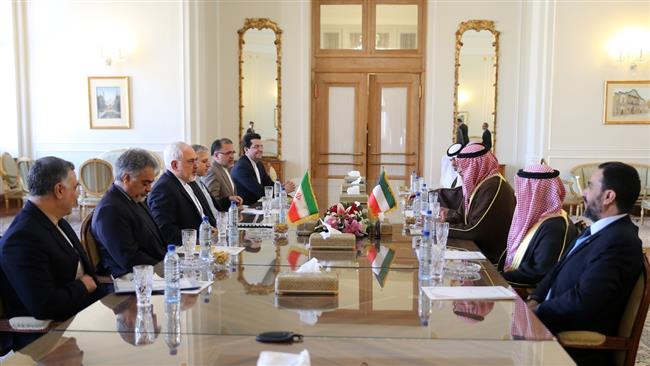
RNA - On Tuesday, Kuwait’s News Agency, KUNA, quoted Kuwaiti Foreign Minister Sheikh Sabah al-Khalid al-Hamad al-Sabah as saying that he would visit Iran the next day to deliver Sheikh Sabah al-Ahmad al-Jaber al-Sabah’s letter to the Iranian president on relations between Iran and the Persian Gulf Arab countries.
The news agency quoted the Kuwaiti foreign minister as saying that relations between Iran and the six Arab states of the [Persian] Gulf Cooperation Council ([P]GCC) "must be based on the UN Charter and principles of international law."
The Kuwaiti diplomat’s one-day visit to Iran is the first by a senior official of a Persian Gulf Arab state to the Islamic Republic after relations between Tehran and some of the Arab countries of the strategic region became tense when Saudi Arabia unilaterally severed its diplomatic ties with Iran.
Escalating tensions
Riyadh cut off ties with Tehran in January 2016 following protests in front of its diplomatic premises in the cities of Tehran and Mashhad against the execution of a top Saudi Shia cleric. The relations had already been strained due to a deadly human crush during Hajj rituals in Mina, near Mecca, in September 2015. About 465 of Iranian pilgrims lost their lives in the incident, which Iran blamed on Riyadh's incompetence to run the Hajj.
Following Saudi Arabia’s severance of relations with Iran, certain Persian Gulf Arab countries cut off or downgraded ties with Iran.
Bahrain followed the Saudi lead and cut off ties with Iran while Qatar recalled its ambassador to Tehran and the United Arab Emirates announced a partial downgrade in diplomatic relations with the Islamic Republic. Oman, however, criticized Riyadh’s move as unwise and incorrect.
'Cooperation against common threats'
During his Wednesday meeting with Iranian Foreign Minister Mohammad Javad Zarif, the Kuwaiti foreign minister highlighted Iran’s position in the region and the world, underlining the need for mutual cooperation in the face of common threats.
Pointing to the long-time relations between his country and Iran, the top Kuwaiti diplomat said Iran and the regional countries enjoyed numerous historical and cultural common points, adding that the two sides should hold talks with a view to future.
Sheikh Sabah, who is also the Kuwaiti deputy prime minister, called for cooperation in the face of common threats to serve the interests of all regional countries.
It is essential that differences be set aside and misunderstandings be removed among the regional countries in a peaceful environment and through dialogue, IRNA quoted the Kuwaiti official as saying.
For his part, Zarif said all regional countries needed to look to future while keeping a watchful eye on common enemies and threats.
He said that the expansion of ties with neighbors was a top priority for Iran and lauded the Kuwaiti emir for his role to promote good neighborly relations among the countries in the region.
Iran has already voiced readiness to cooperate with the countries in the region, including Saudi Arabia, to ward off the challenges gripping the Middle East.
The Iranian foreign minister told the World Economic Forum in Davos, Switzerland, last week that Tehran and Riyadh could work together to help end regional conflicts provided that Saudi Arabia saw the realities on the ground before relations between the two sides could go back to normal.
847/940